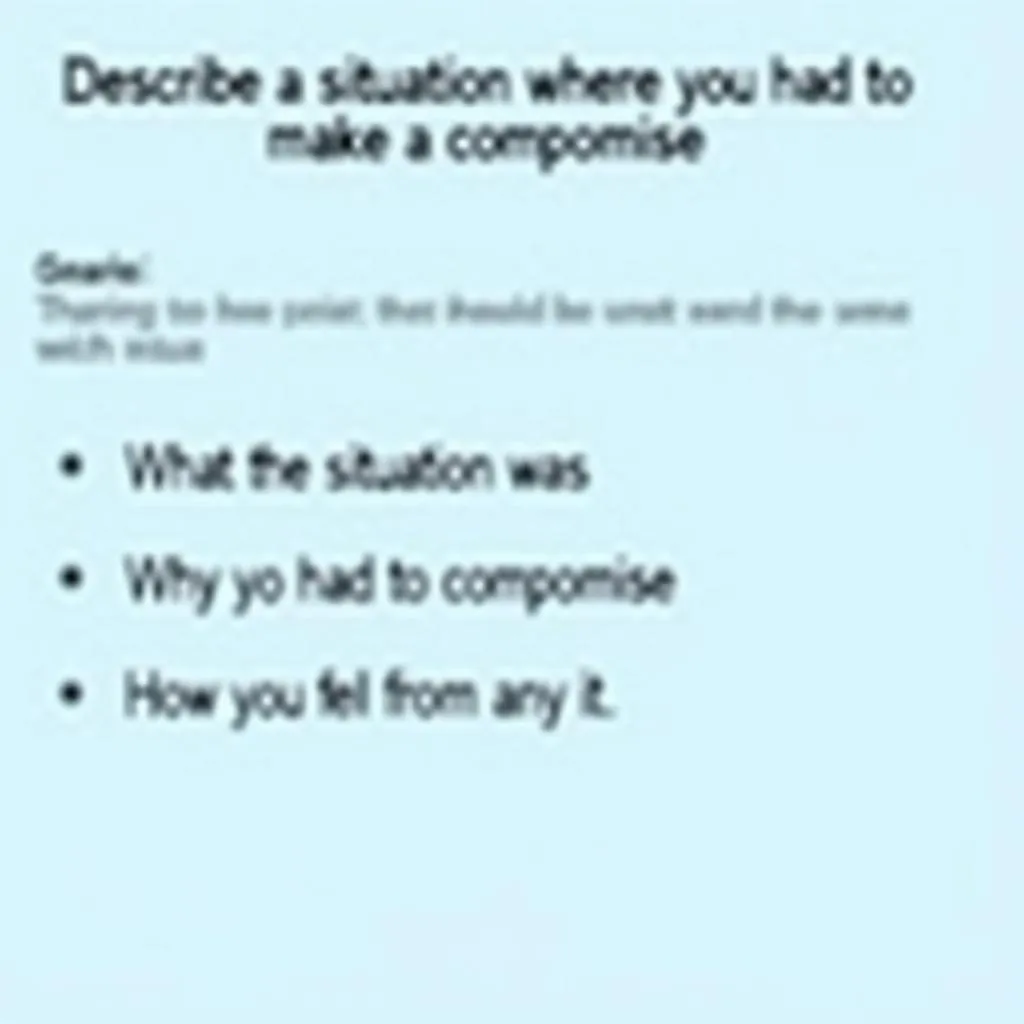The ability to articulate your experiences with difficult subjects is a crucial skill in the IELTS Speaking test. This topic has been a recurring theme in past exams and is likely to remain relevant in future tests. Let’s explore how to effectively answer questions about a subject you found challenging to study.
Part 1: Introduction and Interview
In this section, the examiner may ask general questions about your studies. Here’s a sample question with a suggested answer:
Examiner: “What subject did you find most difficult in school?”
Sample Answer (Band 7-8):
“I’d say mathematics was the most challenging subject for me. The abstract concepts and complex formulas often left me feeling overwhelmed. However, I found that with consistent practice and seeking help from my teachers, I gradually improved my understanding and performance in the subject.”
Describe a time when you had to learn from a mistake can be a great way to discuss how you overcame difficulties in a challenging subject.
Part 2: Long Turn
Cue Card:
Describe a subject you found difficult to study
You should say:
- What the subject was
- Why you found it difficult
- What you did to overcome the difficulty
- How you feel about the subject now
Sample Answer (Band 6-7):
“The subject I found most challenging was Physics. I struggled with it because of the complex mathematical calculations and abstract concepts involved. To overcome these difficulties, I started dedicating more time to studying Physics and sought help from my teacher and classmates. I also began watching online tutorials to gain a better understanding of the concepts. Now, while I still find Physics challenging, I feel more confident in my ability to tackle the subject and even find some aspects of it interesting.”
Sample Answer (Band 8-9):
“The subject that posed the greatest challenge for me was Organic Chemistry. The sheer volume of information to memorize, coupled with the intricate molecular structures and reaction mechanisms, made it a formidable subject to grasp. To surmount these obstacles, I employed a multi-faceted approach. Firstly, I developed a systematic study routine, breaking down complex topics into manageable chunks. I also utilized mnemonic devices to aid in memorization and engaged in group study sessions with peers to discuss and debate difficult concepts. Additionally, I sought out practical applications of the subject matter, which helped contextualize the abstract theories. This comprehensive strategy not only improved my understanding but also kindled a genuine interest in the subject. Now, I view Organic Chemistry with a sense of accomplishment and appreciation for its role in understanding the world around us.”
Follow-up Questions:
Examiner: “How did this experience affect your approach to studying other subjects?”
Sample Answer (Band 7-8):
“This experience profoundly impacted my overall approach to studying. It taught me the importance of perseverance and developing effective study strategies. I now apply the techniques I learned, such as breaking down complex topics and seeking additional resources, to other challenging subjects. This has made me a more resilient and resourceful learner overall.”
Examiner: “Do you think schools should focus more on subjects students find difficult?”
Sample Answer (Band 8-9):
“I believe there’s a delicate balance to strike here. While it’s crucial to provide additional support for students struggling with certain subjects, we must be cautious not to neglect other areas of the curriculum. Perhaps a more individualized approach to education, where students can receive targeted help in their areas of difficulty without compromising their overall learning experience, would be ideal. This could involve supplementary classes, peer tutoring programs, or adaptive learning technologies that cater to each student’s unique challenges and learning pace.”
Describe a puzzle you have played can be an interesting way to discuss problem-solving skills, which are often crucial when tackling difficult subjects.
Part 3: Two-way Discussion
Examiner: “How do you think the education system can better support students who struggle with certain subjects?”
Sample Answer (Band 7-8):
“I believe the education system could improve support for struggling students in several ways. Firstly, implementing smaller class sizes would allow teachers to provide more individualized attention. Additionally, offering extra tutoring sessions or creating peer mentoring programs could help students receive the support they need. Schools could also incorporate more interactive and practical learning methods to make difficult subjects more engaging and accessible.”
Sample Answer (Band 8-9):
“To better support students grappling with challenging subjects, I believe a multifaceted approach is necessary. Firstly, adopting adaptive learning technologies could help tailor the curriculum to individual student needs, allowing for a more personalized learning experience. Furthermore, integrating project-based learning into the curriculum could help students see the practical applications of difficult concepts, thereby increasing engagement and understanding. It’s also crucial to foster a growth mindset among students, emphasizing that struggling with a subject is a natural part of the learning process rather than a reflection of innate ability. Lastly, providing comprehensive teacher training in diverse teaching methodologies would equip educators with the tools to effectively support students with various learning styles and challenges.”
 Student struggling with a difficult subject
Student struggling with a difficult subject
Key Vocabulary and Phrases for High Scores
-
Abstract concepts [ˈæbstrækt ˈkɒnsepts] (noun phrase): Ideas that are not concrete or tangible.
Example: “The abstract concepts in quantum physics were particularly challenging to grasp.” -
To surmount obstacles [tə sərˈmaʊnt ˈɒbstəkəlz] (verb phrase): To overcome difficulties.
Example: “I had to develop new study techniques to surmount the obstacles I faced in calculus.” -
Perseverance [ˌpɜːsɪˈvɪərəns] (noun): Persistence in doing something despite difficulty or delay in achieving success.
Example: “My perseverance in studying organic chemistry eventually paid off with improved grades.” -
To kindle an interest [tə ˈkɪndl ən ˈɪntrəst] (verb phrase): To awaken or inspire interest in something.
Example: “The practical experiments in physics helped kindle my interest in the subject.” -
Multifaceted approach [ˌmʌltɪˈfæsɪtɪd əˈprəʊtʃ] (noun phrase): A strategy that considers many aspects of a situation.
Example: “I adopted a multifaceted approach to learning Spanish, combining textbook study with immersion experiences.”
Describe a person who enjoys outdoor activities can be a great way to discuss how different learning styles, such as kinesthetic learning, can help overcome difficulties in studying.
Examiner’s Advice
To achieve a high score in the IELTS Speaking test when discussing difficult subjects:
- Use a range of vocabulary and complex sentence structures to demonstrate your language proficiency.
- Provide specific examples and personal experiences to support your points.
- Show your ability to analyze and reflect on your learning experiences.
- Practice speaking about various subjects you’ve studied to improve fluency and confidence.
- Listen carefully to the examiner’s questions and address all parts in your responses.
Remember, the key to success is not just in knowing the subject matter, but in effectively communicating your thoughts and experiences.
 Effective study techniques for difficult subjects
Effective study techniques for difficult subjects
Describe a favorite piece of music that makes you feel good can be an interesting way to discuss how you might use music to help you focus or relax when studying difficult subjects.
By following these guidelines and practicing regularly, you can improve your ability to articulate your experiences with challenging subjects, helping you to excel in the IELTS Speaking test.


